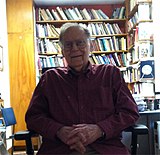Morton Deutsch
| Morton Deutsch | |
|---|---|

Morton Deutsch in his Office, 2012
|
|
| Born |
February 4, 1920 New York City |
| Died | March 13, 2017 (aged 97) |
| Nationality | American |
| Alma mater | City College of New York, University of Pennsylvania, MIT |
| Occupation | Professor at Columbia University, Psychoanalyst |
| Known for | Theories of cooperation and competition, conflict resolution, distributive justice |
Morton Deutsch (February 4, 1920 – March 13, 2017) was an American social psychologist and researcher in conflict resolution. Deutsch was one of the founding fathers of the field of conflict resolution. A Review of General Psychology survey, published in 2002, ranked Deutsch as the 63rd most cited psychologist of the 20th century.
Morton Deutsch was born in 1920 in the Bronx, New York City into a family with three other children. By age 15 he was enrolled in university at the City College of New York. Deutsch started on a path into psychiatry, but switched to psychology after dissecting a guinea pig in a biology class. He received a B.S. from the City College of New York in 1939 and his M.A. in 1940 from the University of Pennsylvania. After his M.A. degree, Deutsch held a rotating internship that cycled between three New York State institutions: Letchworth Village (for the mentally incompetent), Warwick (for delinquent boys), and Rockland State Hospital (for mentally disturbed children and adults).
Deutsch joined the US Air Force after the Japanese attack on Pearl Harbor, where he initially acted as a psychologist, then as a navigator flying in thirty bombing missions over Nazi Germany. During active combat Deutsch was honored with a Distinguished Flying Cross (and cluster) and an Air Medal (with three clusters). After his tour of duty was completed he served as a clinical psychologist in an Air Force convalescent hospital until his discharge. Subsequently, he studied at MIT under Kurt Lewin, where he was graduated with a Ph.D. in 1948. He wrote his dissertation comparing the psychological effects and productivity of cooperative groups and competitive groups. Deutsch worked as a part of Lewin's Research Center for Group Dynamics, and his early research was largely tinged by the growing global concern with nuclear weapons. He was also tasked with instructing introductory psychology classes to undergraduate students, in which he undertook an experiment comparing cooperative and competitive grading processes.
...
Wikipedia
